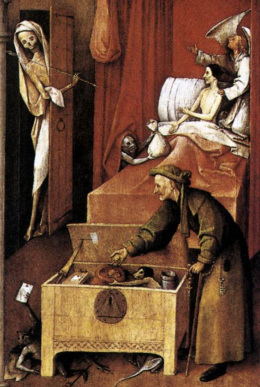Your Email gave the following example of a family inheritance problem. Suppose a couple has a son and a daughter. The mother dies and the father marries another woman who already has grown sons and daughters.
Based on Biblical law, if the man and his new wife do not produce a new family (they do not produce children between them) then who should receive an inheritance when the man dies?
In the example you gave, if the man dies, his biological son produced from his previous marriage would have the right to the greatest share of his father's possessions. The man's surviving widow, with whom he had no children, would have to be supported by her family of male blood relatives.
It is important to note that the principle is likely different from modern laws governing who inherits a person's possessions and how the estates of the deceased should be handled.

For example, most states in America have laws that grant a surviving widow within a family the right to claim a certain percentage (e.g. one third or one half) of her dead husband's estate is hers to keep. This right guarantees a widow receives support after the death of her mate. This right even overrides any wishes to the contrary in a will, such as a husband disinheriting his wife or only offering her a small amount of support.
Biblical examples
There are several examples of family inheritance principles in the Bible. One such interesting principle that was codified occurred at the time of Moses.
The daughters of Zelophehad asserted that they had a right to a share of their dead father's future allotment in the Promised Land. The basis for their claim was that their father did not produce any sons.
Moses took the issue directly to God who agreed that the daughters had a right to their land their father would have received. The principle laid down was, "When a man dies and has no son, then you shall cause his inheritance to pass to his daughter(s)" (see Numbers 27:1 - 11).
Another related Biblical law states that a polygamous man may not prioritize the children of his preferred wife, in regard to his estate, over the children of his less preferred mate(s). He must give a double portion of his possessions to his firstborn son regardless of which of his wives is his mother (Deuteronomy 21:15 - 17).
Ruth and Boaz
An interesting Biblical example involving inheritance centers on Naomi, the mother-in-law of Ruth. Naomi received the land of her husband when he, and both their sons, had died. The problem was that when she wanted to sell the land she had to sell it to a family member who also had to marry Ruth (i.e., the widow of one of Naomi's sons). The couple also had to have children in the name of Naomi's dead husband.
A close relative turned down his right to buy Naomi's land, and all it entailed, because it would endanger his own family inheritance. His actions made it possible for Boaz to buy the land and marry Ruth (Ruth 4:3 - 11). Boaz and Ruth would eventually produce a son named Obed whose own son, Jesse, was the father of King David.
Undergirding these principles within a family was the Jubilee land system (Leviticus 25:8 - 10). Every fifty years the land reverted to its original owners. This system prevented the very old, depressing problem of a small elite group of people ending up possessing most of the land in a primarily agricultural economy such as occurred in the ancient Roman Republic.
Family inheritance, based on the Bible, is founded on the blood relationship and lineage of a man.
In your example, the man's physical descendants would inherit what he owned, the priority being given to sons then to daughters only if no sons existed. The widow would need to be supported by her physical brothers (or other male blood relatives related to her father) if she never had any children with the deceased.